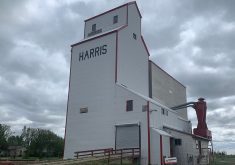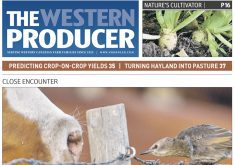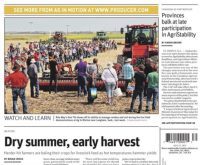For the next year, this column will mark The Western Producer’s 100th anniversary by taking a deep dive every week into a past issue of the paper.
A story in the Feb. 2, 1967, issue provided a good example of how politicians can sidestep a controversy simply by ignoring it. It’s a skill many modern politicians continue to show off on a regular basis.
Back in the winter of 1967, delegates to both the Dairy Farmers of Canada and Canadian Federation of Agriculture annual meetings had vented their frustration with federal agriculture minister J.J. Greene for saying no further aid would be available to the dairy industry.
Read Also

Worrisome drop in grain prices
Prices had been softening for most of the previous month, but heading into the Labour Day long weekend, the price drops were startling.
But when the minister showed up at the CFA meeting, he decided not to address farmers’ anger. Instead, he talked about something else entirely.
“If we are to continue willy-nilly to permit the managers of our industrial and economic community to determine the nature of the Canada we will have in the future, then we will have a continuous uncontrolled growth of these few huge metropolitan complexes,” he said.
“If we would heed the still far too small, far too still voices that are beginning to be heard, that we maintain a Canada which has some 20 percent of its people in our rural areas and our small towns and to create communities that will afford not only an attractive social way of life, but an economic potential which will give a good way of life, then it may well be that this different set of values will require a different book of economic policies.”
I’m sure the CFA delegates would have agreed with most of that, but it sure didn’t address their concerns about dairy farmers.
It was Canada’s centennial in 1967, which wasn’t lost on the Producer.
In this issue, there was a full page article about Bobby Gimby, the Saskatchewan born trumpeter and composer who had written the official centennial song, Ca-na-da.
The page included the song’s lyrics, in both English and French, which was mighty bilingual of the paper’s editors, considering this was before it had become official national policy.















